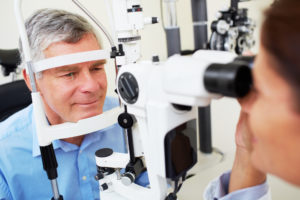What the Big 4-0 May Mean for your Eyes
- Posted on: Oct 15 2017
 We know that every single part of the body changes as we age. Sometimes, we can live with these changes as we grow accustomed to them. Lines and wrinkles are a prime example. Some of the other changes that occur, such as our eyesight, may mean that we have to make certain compromises – at least it may feel that way.
We know that every single part of the body changes as we age. Sometimes, we can live with these changes as we grow accustomed to them. Lines and wrinkles are a prime example. Some of the other changes that occur, such as our eyesight, may mean that we have to make certain compromises – at least it may feel that way.
Today, we are seeing more adults remain active in their careers and personal lives for longer than our ancestors. Certainly, age 40 and even 50 and 60 are relatively early to consider the prospect of retirement these days. As such, though, it becomes even more important to stay on top of eye health.
Do you know that there is a greater risk for several common eye diseases as we age? Do you know that 12% of adults rely on some vision correction, but that 21% of them do not use any? In one poll conducted by the American Academy of Ophthalmology, more than 60% of participants reported experiencing one or more visual disturbances such as poor night vision, double vision, blurriness, floaters and flashes, excessive watering, or difficulty reading up close. That is a lot of people! And yet, more than 15% of them had not seen an eye doctor to discuss their vision problems.
When the Eyes Age
The Big 4-0 is a pivotal time in life, and it also often marks the emergence of vision concerns such as:
- Farsightedness, which causes difficulty seeing up-close.
- Presbyopia, which occurs when the lens of the eye becomes more rigid. Presbyopia is similar to nearsightedness in that it makes up-close work more challenging.
Need for vision correction is one thing, but we also encourage adults of all ages to schedule annual, in-depth eye exams to evaluate overall eye health. Eyeglasses and contact lenses can facilitate clearer vision when the lens thickens, or when the shape of the cornea shift, but do not guard against or help reduce the symptoms of eye diseases.
There are several conditions that may be detected early with routine eye exams. These include:
- Cataracts, caused by a buildup of protein on the eyes’ lens.
- Retinal detachment, in which the retina separates from the tissue that stabilizes it.
- Age-related macular degeneration, or AMD, damages the retina and affects central vision.
- Diabetic retinopathy, an eye disease that occurs secondary to diabetes.
- Dry eye, which is a chronic problem unrelated to digital eye strain.
- Glaucoma, which affects the optic nerve and can cause vision loss.
Most of us remember to schedule our dental and medical exams as needed. Eye exams are also relevant to a long and thriving life. To schedule an exam in our Chester, NJ office, call 908-879-7297.


